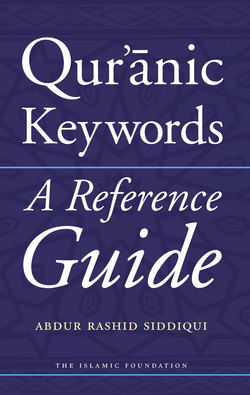Читать книгу Qur'anic Keywords - Abdur Rashid Siddiqui - Страница 7
На сайте Литреса книга снята с продажи.
ОглавлениеForeword
My esteemed colleague Abdur Rashid Siddiqui, author of this book, has asked me to write a short foreword on the assumption that I qualify to do so. Abdur Rashid Siddiqui is quite well known in the academic circle for authoring a number of books on a variety of subjects such as Lift Up Your Hearts, in two volumes, which is a collection of fifty-five Jumuʿah Khuṭbahs, and Key to al-Fātiḥah (The Opening Chapter of the Qur’ān) explaining its basic concepts. His Key to Āl ʿImrān attempts to present the synopsis of the Sūrah and expound its major themes. He has also edited a book entitled Tazkiyah: The Islamic Path of Self-Development. It is an anthology dealing with the purification of the inner soul. He has a passion for studying the Qur’ān and thus, he has spent his energy, time and efforts in trying to understand the Qur’ānic message in depth and then disseminating it to the general English readership, Muslim and non-Muslim alike. Through his writings on a variety of subjects related to the Qur’ān in one form or the other, he has received admiration and praise from the readers.
Muslims are fortunate that, by the grace of Allah, Arabic, the original language of the Revelation (Waḥy), is intact in its original form. Thus, the Arabic language in its purity shall remain in this world as long as the Qur’ān lasts. The ideal situation is that if one intends to grasp the full meaning and thrust of the Qur’ānic verses, one has to go back to the original language which, naturally, everyone cannot do. But, on the other hand, it is possible to gain the intended meaning and understand the general message and thrust of the Qur’ānic verses through translations. But to grasp the deeper complexities and infinite dimensions of the verses does require expertise and mastery over major sciences of the Qur’ān, Ḥadīth: Sayings of the Prophet (peace be upon him), and Islamic jurisprudence in addition to thorough knowledge of the Arabic language.
With the same objective in mind, the author’s present work, Qur’ānic Keywords: A Reference Guide, explains fully the intended meanings of a variety of important Qur’ānic words and terminologies. This latest book is the result of many years of hard work. The author has selected over 140 major Qur’ānic terms and has explained them in simple English in order that those who do not know Arabic well and do not have access to the original sources will be able to grasp the intended meanings and thrust of these words and terms. Sometimes it is difficult to translate into English certain Qur’ānic words and terms exactly as these appear in the original Arabic text. However, it is possible to convey the real intended meaning of these terms into English by explaining them in some detail. It is noteworthy that the author has used authentic original and secondary sources in order to explain and convey the intended meaning. Here two examples will be more than sufficient to show how the author has been able to convey the intended meanings of the Qur’ānic words listed in the book.
The word Ghayb has often been translated into English as “unseen”. But this is a weak translation and does not convey the real intended meaning (see for instance 2: 3 where the word Ghayb occurs). The author has translated and explained correctly that the intended meaning of the word Ghayb is things which human senses cannot perceive. This is exactly what the Qur’ān aims to convey. Likewise, the translators of the Qur’ān into English have translated the word Taqwā in various ways. Some say it means fear of Allah, and some say it is duty to Allah, while others have translated it as piety and other similar renderings. The author has correctly explained its intended meaning, that it means a perpetual consciousness of Allah’s presence in one’s mind as this consciousness of Allah’s presence reminds a believer constantly of his/her accountability to Allah in the Hereafter. Otherwise how would one differentiate and distinguish between the meanings of the words Khashyah (2: 74) and Taqwā if both of these are translated as fear?
The author has ably explained in the Introduction the methodology and arrangement he has employed in dealing with the subject and has indicated the sources he has used in this book. The book contains two indexes, one for Arabic and the other for English terms. A bibliography at the end contains a long list of original and secondary sources which the author has used in the preparation of this book. This book will help the general English reader to understand the Qur’ānic verses better. The task has been made even easier by arranging the listed terms in alphabetical order. In fact, the book is a valuable addition to the Qur’ānic literature in English and it is worth having in every Muslim home as it can also be used as a reference book. The author deserves our praise and gratitude for this timely book. May Allah reward him for his hard work and sincerity.
| Visiting Professor of Islamic Studies,Markfield Institute of Higher Education,Leicester, UK.March 23rd, 2007 | Syed Salman Nadvi |
